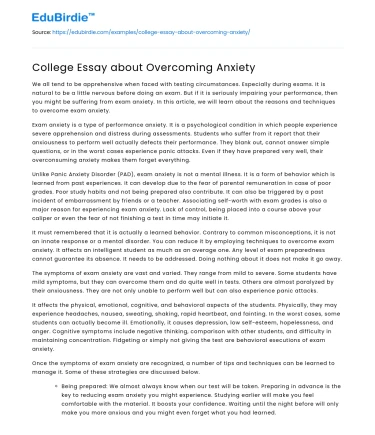We all tend to be apprehensive when faced with testing circumstances. Especially during exams. It is natural to be a little nervous before doing an exam. But if it is seriously impairing your performance, then you might be suffering from exam anxiety. In this article, we will learn about the reasons and techniques to overcome exam anxiety.
Exam anxiety is a type of performance anxiety. It is a psychological condition in which people experience severe apprehension and distress during assessments. Students who suffer from it report that their anxiousness to perform well actually defects their performance. They blank out, cannot answer simple questions, or in the worst cases experience panic attacks. Even if they have prepared very well, their overconsuming anxiety makes them forget everything.
Save your time!
We can take care of your essay
- Proper editing and formatting
- Free revision, title page, and bibliography
- Flexible prices and money-back guarantee
Unlike Panic Anxiety Disorder (PAD), exam anxiety is not a mental illness. It is a form of behavior which is learned from past experiences. It can develop due to the fear of parental remuneration in case of poor grades. Poor study habits and not being prepared also contribute. It can also be triggered by a past incident of embarrassment by friends or a teacher. Associating self-worth with exam grades is also a major reason for experiencing exam anxiety. Lack of control, being placed into a course above your caliper or even the fear of not finishing a test in time may initiate it.
It must remembered that it is actually a learned behavior. Contrary to common misconceptions, it is not an innate response or a mental disorder. You can reduce it by employing techniques to overcome exam anxiety. It affects an intelligent student as much as an average one. Any level of exam preparedness cannot guarantee its absence. It needs to be addressed. Doing nothing about it does not make it go away.
The symptoms of exam anxiety are vast and varied. They range from mild to severe. Some students have mild symptoms, but they can overcome them and do quite well in tests. Others are almost paralyzed by their anxiousness. They are not only unable to perform well but can also experience panic attacks.
It affects the physical, emotional, cognitive, and behavioral aspects of the students. Physically, they may experience headaches, nausea, sweating, shaking, rapid heartbeat, and fainting. In the worst cases, some students can actually become ill. Emotionally, it causes depression, low self-esteem, hopelessness, and anger. Cognitive symptoms include negative thinking, comparison with other students, and difficulty in maintaining concentration. Fidgeting or simply not giving the test are behavioral executions of exam anxiety.
Once the symptoms of exam anxiety are recognized, a number of tips and techniques can be learned to manage it. Some of these strategies are discussed below.
- Being prepared: We almost always know when our test will be taken. Preparing in advance is the key to reducing exam anxiety you might experience. Studying earlier will make you feel comfortable with the material. It boosts your confidence. Waiting until the night before will only make you more anxious and you might even forget what you had learned.
- Self-encouragement: Banish negative thoughts like, ‘I am no good ‘, ‘I can’t do this’ or ‘I will fail’. Instead, motivate yourself with self-encouraging thoughts. The expressions like ‘I know this’, ‘I prepared well’, and ‘I can do this ‘ when repeated regularly will boost your self-confidence and help you manage stress levels.
- Sleep well: Getting enough rest helps concentrate better. A good night’s sleep makes you more alert and improves memory.
- Deep breaths: If you happen to experience anxiety during an exam, breathe deeply. Inhale through your nose and exhale through the mouth. Focus on one question at a time, and work through it while taking a deep breath in between as required. Providing the lungs with sufficient oxygen calms you down and helps you focus better.
- Avoid being a perfectionist: Remember that nobody is perfect. Making mistakes is a part of life. Just aim to do your best. Hard work always pays off. Focus on doing better than the last time and not on being perfect.
Exam anxiety is certainly stressful and difficult. It can be treated by employing strategies designed to control it. It can also be managed by using self-help techniques to overcome exam anxiety. However, if you find yourself or someone else struggling with it, seek advice from a physician or a counselor.






 Stuck on your essay?
Stuck on your essay?

